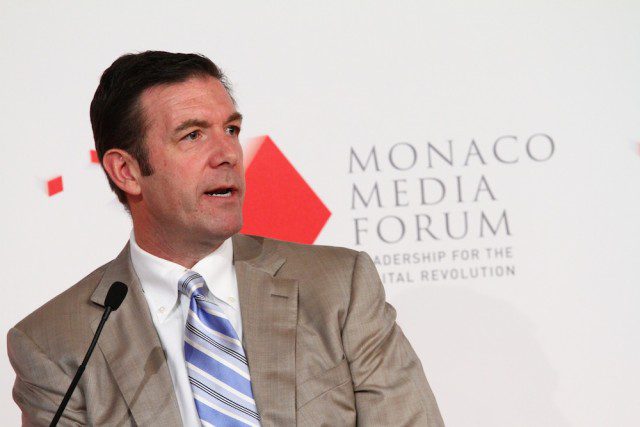
One has faced challenges in its existing online ad business, while the other is just getting going. Now Microsoft and its recently acquired Skype are setting out to prove they can profit where consumers aren’t paying — by introducing a new lineup of advertising formats native to their new products.
At Monaco Media Forum, Microsoft’s advertising and online corporate VP Frank Holland said the firm was no longer just trying to sell advertisers to its web services like Bing and MSN — now the very system level of new-look Windows 8 is up for grabs as real estate. “It’s more useful to a consumer,” Holland said. “Where the consumer finds utility, marketers want to be.”
 So far, Microsoft has trialled a spot in the Accuweather app on Windows 8’s start screen for Jeep, in which the vehicle reacts to weather forecasts.
So far, Microsoft has trialled a spot in the Accuweather app on Windows 8’s start screen for Jeep, in which the vehicle reacts to weather forecasts.
The beauty of building in ads at this OS level is more than just reaching users where they find utility, Holland said. “We can measure when someone takes their index finger and scrolls to get to an ad, when it’s presented and how deep they get in to it. You’re getting a lot more detail in a contextually relevant sense than if you were clicking on a banner ad.
“So far, we’re sold out. These sponsorships last for three months. The next sponsors come up in February and we’re already seeing some pretty strong pipeline there.”
Skype introduced basic display banners in March 2011, two months before Microsoft announced it would buy the internet calling service. Now it, too, is moving on to new concepts.
In a later session, Skype president Tony Bates told Monaco Media Forum he would introduce “conversation ads” and “more sharing moments” that are part and parcel of Skype’s regular usage.
 “We think it can go a lot further, we’re going to broaden the experience,” Bates said. “If I want to share something with you as a friend on Skype, you’re more likely to find that very relevant and have a deeper affinity with that.”
“We think it can go a lot further, we’re going to broaden the experience,” Bates said. “If I want to share something with you as a friend on Skype, you’re more likely to find that very relevant and have a deeper affinity with that.”
That could be “the ability to share a customer service moment, a buying moment and so on.” “We think, in future, you could have a sponsored group or brand that would literally be a contact in Skype, and could have a meaningful connection. This is a big shift.”
So far, it’s also somewhat vague. What’s more, figuring out the pricing structure and return on investment for such a mechanism could also prove challenging. But what both Bates and Holland were speaking to was an ambition to bake advertising so deep in to their products that it is indistinguishable from utility.
“We want to be careful not to interrupt the Skype experience,” Holland said. “We don’t want to let the golden egg of two people having a conversation to turn in to anything else.”
Nevertheless, one example he is envisaging from Skype is: “Let’s design a Nike shoe together online if we happen to be in the mood to do that.”
That doesn’t sound like the kind of organic conversation that two people would ordinarily have.
But new formats matter. Microsoft this summer wrote off most of the $6.3 billion it paid to acquire online ad outfit aQuantive, many folks are freaking out about an ongoing collapse in web ad rates and others are concerned about the conventional search ads model embodied by engines like Bing is giving way to social discovery.
Now Microsoft is trying out new techniques like Xbox ads engaged with via Kinect.
Skype also has its challenges. The app is widely used but little paid-for. In last year’s S-1 filing, the outfit disclosed average monthly users currently stood at around 145 million, but only 8.8 million of them are paying users. That represents a big opportunity to monetise freeloaders, if Skype can make the right call.
In Monaco, sounding more like an ad space salesman than a VoIP operator, Skype’s Bates said what are now 218 million users clock up an average two hours and 55 minutes engagement time. Bates’ hope is to sell ad buyers on this “engagement” — but what concepts we see in reality, who knows?
Regardless, Microsoft’s Holland had a note of surprise for anyone who thought Microsoft’s main line was in making operating systems. “We’re a media company when it comes down to it,” he said.